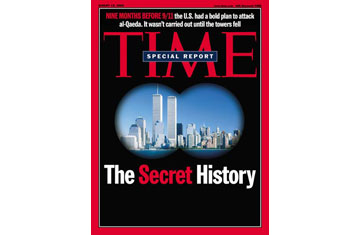
(18 of 19)
Around Sept. 1, Massoud summoned his top men to his command post in Khoja Bahauddin. The intention was to plan an attack, but Zahir Akbar, one of Massoud's generals, remembers a phone call after which Massoud changed his plans. "He'd been told al-Qaeda and the Pakistanis were deploying five combat units to the front line," says Akbar. Northern Alliance soldiers reported a buildup of Taliban and al-Qaeda forces; there was no big push from the south, although there were a number of skirmishes in the first week in September. "We were puzzled and confused when they didn't attack," says a senior Afghan intelligence source. "And Taliban communications showed the units had been ordered to wait."
What were they waiting for? Some of Massoud's closest aides think they know. For about three weeks, two Arab journalists had been waiting in Khoja Bahauddin to interview Massoud. The men said they represented the Islamic Observation Center in London and had a letter of introduction from its head, Yasser al-Siri. The men, who had been given safe passage through the Taliban front lines, "said they'd like to document Islam in Afghanistan," recalls Faheem Dashty, who made films with the Northern Alliance and is editor in chief of the Kabul Weekly newspaper. By the night of Sept. 8, the visitors were getting antsy, pestering Massoud's officials to firm up the meeting with him and threatening to return to Kabul if they could not see Massoud in the next 24 hours. "They were so worried and excitable they were begging us," says Jamsheed, Massoud's secretary.
The interview was finally granted just before lunch on Sunday, Sept. 9. Dashty was asked to record it on his camera. Massoud sat next to his friend Masood Khalili, now Afghanistan's ambassador to India. "The commander said he wanted to sit with me and translate," says Khalili. "Then he and I would go and have lunch together by the Oxus River." The Arabs entered and set up a TV camera in front of Massoud; the guests, says Khalili, were "very calm, very quiet." Khalili asked them which newspaper they represented. When they replied that they were acting for "Islamic Centers," says Khalili, he became reluctant to continue, but Massoud said they should all go ahead.
Khalili says Massoud asked to know the Arabs' questions before they started recording. "I remember that out of 15 questions, eight were about bin Laden," says Khalili. "I looked over at Massoud. He looked uncomfortable; there were five worry lines on his forehead instead of the one he usually had. But he said, 'O.K. Let's film.'" Khalili started translating the first question into Dari; Dashty was fiddling with the lighting on his camera. "Then," says Dashty, "I felt the explosion." The bomb was in the camera, and it killed one of the Arabs; the second was shot dead by Massoud's guards while trying to escape. Khalili believes he was saved by his passport, which was in his left breast pocket--eight pieces of shrapnel were found embedded in it. Dashty remembers being rushed to a helicopter with Massoud, who had terrible wounds. The chopper flew them both to a hospital in Tajikistan. By the time they arrived, Massoud was dead.
